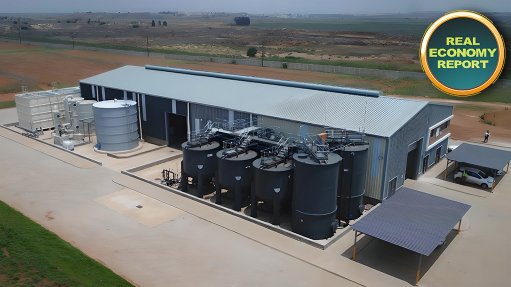A sober workforce is non-negotiable in the transport sector
This article has been supplied as a media statement and is not written by Creamer Media. It may be available only for a limited time on this website.
By Rhys Evans, MD at ALCO-Safe
(Showroom): A sober workforce is the most effective risk management tactic a company can take. Employees that abuse alcohol and other intoxicating substances cost their company time and money, while putting their livelihoods at risk. Employers have a duty to provide a safe working environment for all workers, which includes preventing employees from entering the workplace under the influence of intoxicating substances. Employees have an obligation to accept the workplace policies regarding alcohol and drugs, as well as a duty to confirm that they are abiding by all applicable policies and laws pertaining to substance-free programmes.
While it is for employers in the transport sector to decide whether their workplace policies will involve drug testing (along with routine alcohol testing) as well as how and when these will be carried out, it is recommended that these policies be carefully relooked and brought up to date. Companies must establish that they are doing everything within their means to ensure a sober workforce is behind the wheel on South Africa’s roads.
The Occupational Health & Safety Act takes precedence
Transport companies should already be accustomed to testing their drivers before they are permitted to get behind the wheel of any truck or transport vehicle. Testing drivers once they have arrived at their destination is an effective way of ensuring that such drivers have not consumed any intoxicating substances during their journey. This is important particularly for long-distance trips. For many drivers who have come under disciplinary action due to the fact that they were found to have consumed intoxicating substances or found with a breath alcohol level above the level permissible by the Occupational Health & Safety Act, it is important to remember that the workplace does not have to be a physical location for the driver. Their workplace is their vehicle, and as such, there can be no argument that the National Road Traffic Act allows for a higher permissible alcohol level with public road users.
Testing starts at the depot
Transport drivers are considered professionals, their vehicles their workplaces, and as such, the Occupational Health & Safety Act trumps the National Road Safety Act in requiring the strict enforcement of rules relating to workplace intoxication by their employers. While such drivers could not be prosecuted by the national traffic police in terms of the Occupational Health & Safety Act, their employers certainly can take zero tolerance disciplinary action within the full ambit of the law. Breathalyser tests at the vehicle depot are useful tools within the transport company’s arsenal when enforcing workplace substance abuse policies. Saliva-based drug tests are useful for picking up a variety of substances (depending on what companies are looking for) that have been consumed within the previous two or three days.
Technology takes testing on the road
Additionally, testing technology has advanced to offer employers more effective safeguarding measures on their vehicles, to prevent intoxicated drivers from being a danger to themselves and others on the road. Many trucking companies are now making use of a device called an InterLock, which is a breathalyser that works with the ignition system of a truck. This ignition interlock device (IID) is a form of electronic monitoring that requires the driver to blow into a mouthpiece on the device before starting or continuing to operate the vehicle. If the resultant breath-alcohol concentration analysed results exceed the programmed blood alcohol concentration, the device prevents the engine from turning on. At random times after the engine has been started, the IID will require another breath sample, known as a rolling retest, which is done to prevent someone other than the driver from providing a breath sample.
Trucking companies can now also make use of an app-controlled breathalyser test management platform for regular, remote capturing, sharing and tracking of breathalyser test data. This empowers fleet operators to facilitate the remote testing of drivers. Drivers can be prompted to perform breathalyser tests on themselves, making the data instantly available for analysis and sharing, in real time. Tests are matched with photographic identity, GPS position, date, time, device serial number and test result, in order to eliminate the possibility of tricking the system.
Making IIDs compulsory
If the government were to make it compulsory for such electronic monitoring devices to be installed in 18-wheeler trucks and vehicles used for long-distance haulage, this would be effective in reducing intoxication-related accidents and fatalities. This would take the responsibility of monitoring driver intoxication out of the ambit of traffic police, and place it squarely with their employers. These electronic monitoring devices would have additional risk-reduction benefits that would result in lower insurance premiums and safer roads for all users.
Comments
Press Office
Announcements
What's On
Subscribe to improve your user experience...
Option 1 (equivalent of R125 a month):
Receive a weekly copy of Creamer Media's Engineering News & Mining Weekly magazine
(print copy for those in South Africa and e-magazine for those outside of South Africa)
Receive daily email newsletters
Access to full search results
Access archive of magazine back copies
Access to Projects in Progress
Access to ONE Research Report of your choice in PDF format
Option 2 (equivalent of R375 a month):
All benefits from Option 1
PLUS
Access to Creamer Media's Research Channel Africa for ALL Research Reports, in PDF format, on various industrial and mining sectors
including Electricity; Water; Energy Transition; Hydrogen; Roads, Rail and Ports; Coal; Gold; Platinum; Battery Metals; etc.
Already a subscriber?
Forgotten your password?
Receive weekly copy of Creamer Media's Engineering News & Mining Weekly magazine (print copy for those in South Africa and e-magazine for those outside of South Africa)
➕
Recieve daily email newsletters
➕
Access to full search results
➕
Access archive of magazine back copies
➕
Access to Projects in Progress
➕
Access to ONE Research Report of your choice in PDF format
RESEARCH CHANNEL AFRICA
R4500 (equivalent of R375 a month)
SUBSCRIBEAll benefits from Option 1
➕
Access to Creamer Media's Research Channel Africa for ALL Research Reports on various industrial and mining sectors, in PDF format, including on:
Electricity
➕
Water
➕
Energy Transition
➕
Hydrogen
➕
Roads, Rail and Ports
➕
Coal
➕
Gold
➕
Platinum
➕
Battery Metals
➕
etc.
Receive all benefits from Option 1 or Option 2 delivered to numerous people at your company
➕
Multiple User names and Passwords for simultaneous log-ins
➕
Intranet integration access to all in your organisation


















